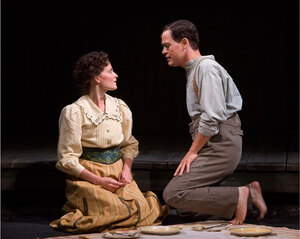Musical pleases with its genre-bending minimalism
This is not the stuff of musicals.
Gruesome murder, racism in the South, unseemly politicking, media sensationalism, official corruption, Messianism, public morality — rarely are such weighty issues even considered as themes for musicals, a genre serious theatergoers regularly denigrate for its bubbly superficiality and lack of profundity. Musicals are to theater what romance novels are to fiction: the bane of the art form, and self-indulgent excursions into a temporary state of mindlessness.

Deep South · Lara Pulver and and Grey’s Anatomy’s T.R. Knight star as husband and wife in Parade, now playing at the Mark Taper Forum. The musical’s dark themes and minimalist design makes it a standout. - Photo courtesy of Craig Schwartz
At least, that is their reputation. But Parade is surely a case in point.
There are no happy endings, elaborate sets or flashy production numbers here. Parade is one of those all-too-rare works of striking theatrical minimalism.
Parade, which first opened on Broadway in 1998, recounts a real-life American tragedy: the case of Leo Frank, played here by T.R. Knight (formerly George on Grey’s Anatomy). In 1913, Frank, a Jewish businessman who grew up in Brooklyn, was convicted of raping and killing 13-year-old Mary Phagan, one of the several young girls who worked for pennies at Frank’s pencil factory in Atlanta. The state’s governor later commuted Frank’s death sentence to life in prison, even though Frank was in all likelihood innocent.
The case — made into a cause célèbre by a sensationalist yellow press — is widely regarded as one of the gravest missteps of justice in American history, and an example of blatant anti-Semitism in the South. Frank was later kidnapped and lynched by an angry mob.
The playwrights — Jason Robert Brown composed the Tony Award–winning score and collaborated with Tony Award-winner Alfred Uhry on the script — take a few historical liberties with the plot, but the original story remains largely intact. The question, of course, is: Why a musical?
Because it works — sensationally. More than a simple retelling of history, Parade elevates Frank’s tragic story to a kind of spiritual profundity, indeed rousing our conscience and startling our propriety. Music, properly employed, can do what mere words can’t, and Brown’s understated score is exquisitely employed. “It Don’t Make Sense,” sung by a young, grieving Frankie Epps (played with heartrending sincerity by Curt Hansen) over the grave of Mary (a graceful Rose Sezniak), succeeds in capturing the mood of a funeral where words would have failed. Few would be able to harden their hearts against such a raw display of emotion and hold back the tears.
But the story is as much about Mary’s death and the subsequent trial as it is about Frank’s strained relationship with his wife, Lucille (Lara Pulver). Knight’s Frank is a neurotic, romantically awkward workaholic who would rather go into work on Confederate Memorial Day than have a picnic with Lucille. But as Frank stands trial and is relentlessly attacked by a racist public, corrupt officials and a sleazy press, Lucille nobly stands by her husband, and, over the course the play, their relationship grows deeper and finally blooms. Frank has to lose nearly everything before he realizes what he had all along — the best partner he could ask for.
Knight lacks stage presence at times, and can’t quite match Pulver vocally, but the show rarely suffers for it. The cast’s accent work is generally inconsistent, but Knight is a believable Brooklyn Jew (the Yiddish intonation helps).
Other performers can’t quite suppress the urge to overplay their parts. P.J. Griffith, angrily belting out big notes and constantly throwing his arms heavenward, confuses his Tom Watson, the religious zealot who galvanizes the town against Frank, with someone from The Phantom of the Opera. Christian Hoff’s Hugh Dorsey, the prosecutor in the trial, plays it far too cool.
By contrast, Deidrie Henry and David St. Louis, both who play more than one part (as do others in the cast, which, along with the occasionally uneven script, can be very confusing), are both revelations — especially during their duet, “A Rumblin’ and a Rollin,’” which opens the second act. They wonder whether the death of a black child would have caused a similar outcry — a question that many still pose today.
The actual trial is a terrifying scene. Each of the witnesses were probably coached by Dorsey, which is especially clear in “The Factory Girls/Come up to My Office,” where the factory girls each recount, in spine-chilling similarity, Frank’s sexual interest in them. When Frank is sentenced to death, the town leaps to its feet in a grotesque cakewalk, eerily lit by Neil Austin’s effective and sometimes cleverly ironic lighting and underscored by Jon Weston’s dramatic sound design.
This slightly modified version of the 1998 original is expertly directed by Rob Ashford, who uses Christopher Oram’s minimalist scenic design — a two-story structure that serves every setting need, prison to ballroom — and period-appropriate costuming to great effect. And not enough can be said of Brown’s music and lyrics. There are no showstopping numbers, and very few chances for the sort of vocal acrobatics that people have come to expect of Broadway shows. Instead, we are treated to a moving score, built on ostinatos, that combines pop and gospel influences into a wondrous beauty. It makes the show what it is: A musical to rival anything that has come out of the theater — musical or not — in recent years.

Comments are closed.